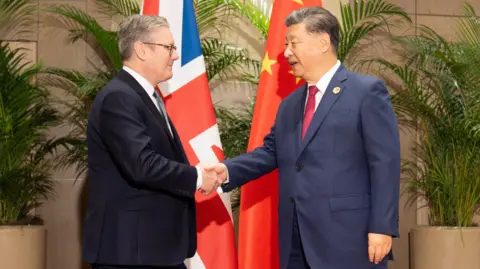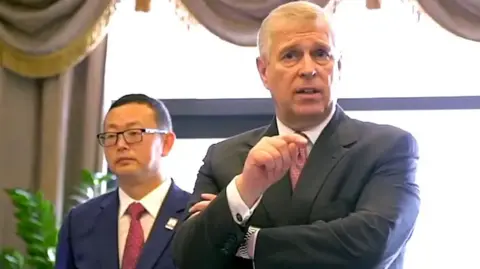Espionage allegations create dilemma for Britain’s China policy

 pa media
pa mediaThe Chinese embassy has told Britain to “stop causing trouble” after a businessman was banned from the country on charges of being a spy for China.
Yang Tengbo, who denies wrongdoing, and the revelations about his relationship with Prince Andrew have renewed calls for Britain to declare China a national security threat.
The issue poses a dilemma for the government, which is hoping to strengthen ties with China to boost economic growth and help tackle shared issues such as climate change.
Several senior Conservatives in the House of Commons on Monday called for tougher measures to protect Britain from covert Chinese influence.
The previous Tory government proposed a foreign influence registration schemeWhich would require individuals and organizations working for a foreign power to declare any political lobbying.
The scheme will have two tiers, with the “advanced tier” requiring specified countries to register a wide range of activities “where this is necessary to protect the UK’s security interests”.
Although there have been delays in implementation, the measures are now set to take effect next summer.
Conservative former Home Secretary Suella Braverman claimed the plan was “ready to go” in time for the July general election and was one of several Tory MPs who called for China to be placed at an advanced level.
Meanwhile, former security minister Tom Tugendhat said MI5 had advised the plan was “not worth it” if China was not at an advanced level.
Ex-Tory leader Sir Iain Duncan Smith, who like Tugendhat is sanctioned by China and is one of the country’s most vocal critics, said there should be “no further delay” in implementing the plan.
He said Mr Yang was not a “lone wolf” but one of thousands of individuals who had infiltrated Britain’s institutions.
When the party was in government, the Conservatives were divided over whether or not to designate China a security threat.
Powers to introduce a foreign influence registration scheme were part of laws passed in July 2023, but were not brought in until the general election a year later.
Speaking on Monday, Security Minister Dan Jarvis insisted the plan was not ready when Labor took office and the government was now planning to introduce the rules to Parliament in the new year, before launching in the summer .
However, he declined to confirm whether China would be in the advanced tier, saying only that decisions would be based on “robust security and intelligence analysis.”
 supply
supplyAt a time when the UK government is seeking a more stable relationship, such a move is likely to provoke a reaction from China.
Last month Sir Keir Starmer met President Xi Jinping on the sidelines of the G20 summit in Rio Janeiro – the first time a British prime minister has met the Chinese leader in person since 2018.
Chancellor Rachel Reeves is also due to visit Beijing next year to discuss economic cooperation with her Chinese counterpart.
It comes after a period of strained relations between the two countries over a range of issues, including China’s treatment of the Uyghur minority group in Xinjiang and pro-democracy activists in Hong Kong.
On Monday, Sir Keir said he was “concerned” about the challenge posed by China, but reiterated the government’s position that it was essential to cooperate on issues such as trade, climate change and human rights.
As one of Britain’s largest trading partners, any souring of relations with China could impact the government’s goal of boosting economic growth domestically.
Banks including HSBC and Standard Chartered have reportedly raised private concerns about the potential impact of including China in the increased levels.
according to bloombergOfficials fear that if they are forced to declare the activity it could lead to business disruption and negative publicity.
China has strongly denied the spying claims and accused some lawmakers of trying to “defame” the country.
The ongoing dispute, coupled with the decision to designate the country as a national security threat, could further damage Britain’s efforts to improve relations.






